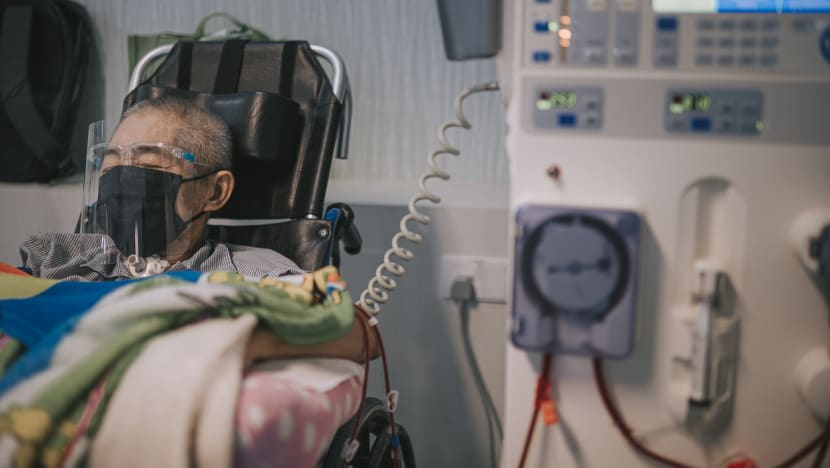National Kidney Foundation warns of rapidly rising renal failure cases, urges more to opt for dialysis at home
Six people are now diagnosed every day, a three-fold increase from two decades ago, and it is estimated that five dialysis centres need to be built every year to cope with the increase.

File photo of a man undergoing dialysis in hospital. (Photo: iStock/Edwin Tan)
SINGAPORE: The National Kidney Foundation (NKF) has warned of a “kidney tsunami” with the number of renal failure cases in Singapore rising at a rate that will make it hard for the healthcare system to cope.
Six people are now diagnosed every day, a three-fold increase from two decades ago.
The NKF, which cares for a majority of dialysis patients in the country, treats 600 new patients each year. NKF currently has 41 centres, but with kidney failure cases rising more quickly because of ageing and diabetes, it is estimated that five additional centres need to be built every year.
NKF gets about 100 new dialysis applications per month, its chief executive officer Tim Oei told CNA.
“That is of grave concern that we see must be addressed and we can't keep on providing space, neither can the hospitals cope,” he said.
Haemodialysis, which NKF provides, has to be done at a centre by a nurse and needs to be done thrice a week, four hours each time, he said.
PERITONEAL DIALYSIS AT HOME
Singapore cannot fully rely on haemodialysis, said Mr Oei.
While prevention of renal failure is important as a long-term goal in easing the load, in the short term, more support can be given in the community for peritoneal dialysis which can be done at home, he said.
NKF is aiming to get more kidney dialysis patients on peritoneal dialysis, a shift the Government has also called for.
Health Minister Ong Ye Kung said in a speech in August this year that his ministry is pushing for a peritoneal dialysis-preferred approach for patients who are eligible for this treatment option.
The aim is to have 30 per cent of new dialysis patients to opt for peritoneal dialysis by 2025, up from the current rate of 20 per cent, he said.
In peritoneal dialysis, a special sterile fluid is introduced into the abdomen through a permanent tube that is placed in the peritoneal cavity – the space within the abdomen that contains the intestines, the stomach and the liver. The fluid circulates through the abdomen to draw impurities which are then drained from the body.
“Peritoneal dialysis can be done at home. That allows patients more flexibility in terms of suiting their lifestyle and also gives them flexibility to make other arrangements be it work or home,” he said.
Currently, training is provided in hospitals, but NKF wants to support peritoneal dialysis in the community setting, he added.
“We feel that some of this training can be done in a community setting, be it at an NKF centre or at the home of the patients and the idea is to give them time to settle in this treatment modality,” he said.
There is a lack of understanding on the pros and cons of both therapies, Mr Oei said. To help patients, NKF arranges for new patients to be visited by current patients who can share their experiences, he said.
FLEXIBILITY WITH PERITONEAL DIALYSIS
Among patients who are eligible for and opted for peritoneal dialysis at home is Mr Yusop Yacob.
The 70-year-old, who has been undergoing dialysis since August last year, uses a machine, typically for eight to 10 hours overnight.
"I'm like a robot, night time I'm charging myself, day time I'm fully charged and can walk around,” Mr Yusop quipped.
The process requires him to connect a tube to the abdomen and Mr Yusop and his wife had to attend a week-long training to be prepared for peritoneal dialysis.
Mr Yusop said he enjoys the freedom of undergoing treatment at home as opposed to haemodialysis.
“(For haemodialysis), rain or shine, you have to go to the centre, whereas this one, I can do it at home at my own time,” he told CNA.
Mr Oei urged people to take responsibility for their health.
Many times, patients who are eventually diagnosed with renal failure enter the healthcare system through the emergency department, after failing to heed the advice of doctors to seek medical attention early, he said.
“A lot of the illnesses we see were not addressed at a very early stage and that is the point where if you come to an A&E setting, you don't have much choice,” he said.
“NKF believes that early detection, understanding and even the understanding of the consequences of the illness will help us take more proactive action.”
















